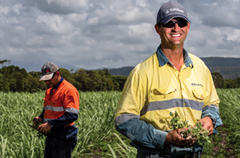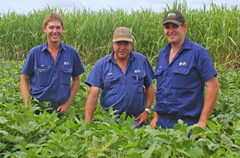The importance of fallowing as a best management practice has been widely recognised and embraced by growers. It is an important management tool not only for soil health, but also for pest and disease management.
Continual plough-out and replant contributes to the build-up of pests and disease, while the introduction of break crops helps to reduce stress on the next crop to be planted. Fallowing also allows farm blocks to be realigned or, if necessary, drainage works to be performed.
Benefits include: breaking the pest and disease cycle; helping to suppress weed growth; preventing soil erosion; increasing soil biomass and organic matter; increasing nitrogen levels in soil; and improving soil structure.
 Glen Fasano and his sons Scott and Michael are using peanut fallow crops to increase organic matter in the soils and breaking the monoculture, while also developing a new income stream. Benefits include reduced fertiliser use, improved soil health, no reduction in yield or sugar, while making some extra money. Read more.
Glen Fasano and his sons Scott and Michael are using peanut fallow crops to increase organic matter in the soils and breaking the monoculture, while also developing a new income stream. Benefits include reduced fertiliser use, improved soil health, no reduction in yield or sugar, while making some extra money. Read more.
 Gerry Deguara and his sons employ a range of farming methods to boost productivity and deliver environmental benefits. Implementing a fallow program, with soya beans planted in summer and chick peas in winter, is an important way of aiding soil health and putting nitrogen back into the ground. Gerry says when the economic and environmental drivers line up, the decision to make changes to their farming practices is easy. Watch more.
Gerry Deguara and his sons employ a range of farming methods to boost productivity and deliver environmental benefits. Implementing a fallow program, with soya beans planted in summer and chick peas in winter, is an important way of aiding soil health and putting nitrogen back into the ground. Gerry says when the economic and environmental drivers line up, the decision to make changes to their farming practices is easy. Watch more.

.jpg)